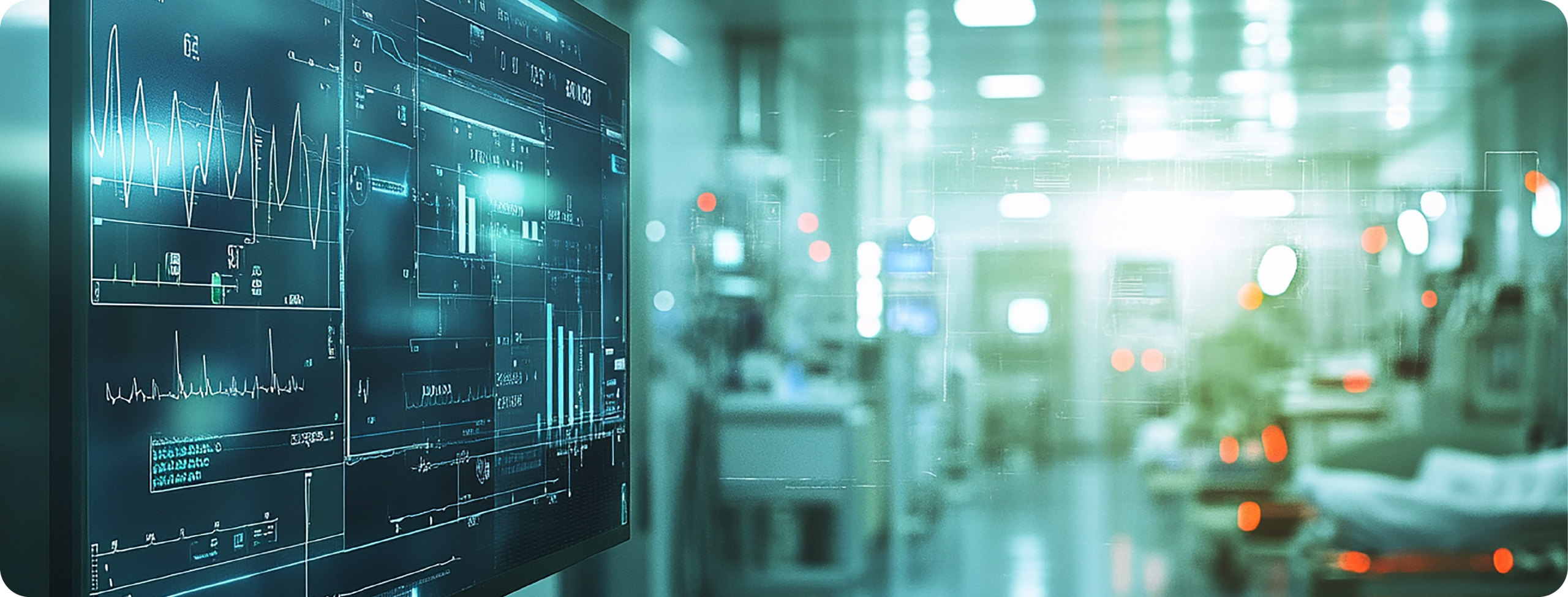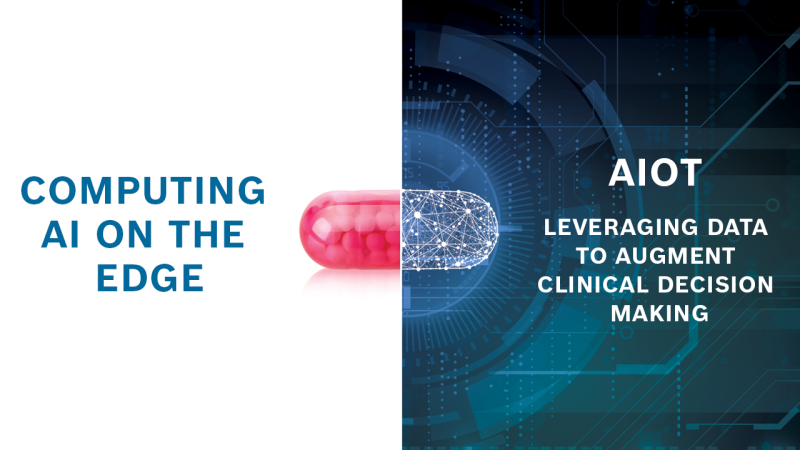AIoT: Leveraging Data to Augment Clinical Decision Making

Summary
AIoT is revolutionizing clinical decision-making by improving diagnostics, predictive analytics, and healthcare efficiency. At Bosch Conversations, industry leaders from Bosch, Intel, and Roche discussed AI-driven healthcare innovations, structured data exchange, and cancer detection advancements. In this blog, we explore Bosch’s role in AIoT-powered solutions, enhancing interoperability, point-of-care diagnostics, and personalized treatments for better patient outcomes.
Introduction
As medical knowledge expands and new evidence-based care standards emerge, clinical decision support systems must play their role in the healthcare ecosystem. Such support systems have the capability to address inefficiencies in the testing domain including incorrect test ordering, insufficient information on patient records, medical slip-ups, and inappropriate or over-treatment of patients. Today, we stand at the cross-section of a major healthcare revolution in clinical decision-making and AIOT has a central role to play.
I’ve been closely witnessing AI transform healthcare with accurate diagnostics, predictive analytics for population health management and reduced re-admission rates. Cutting-edge technologies have applications in a wide spectrum of scenarios including early identification of high-risk patients, monitoring the spread of the disease, predicting mortality risk by analyzing patient’s health history and remote treatments.
These discussions were a part of the most recent Bosch Conversations – an initiative to bring together industry experts to demystify new-age technologies and help people understand how they can leverage these technologies to sustain, thrive, and grow in a rapidly changing world.
The event on the topic ‘Leveraging Data to Augment Clinical Decision Making’ was led by speakers and panelists who are actively working in this space. These stalwarts shared some thought-provoking insights on AIoT trends and their implications on the entire healthcare ecosystem.
The ground reality
A PwC survey discovered that only about one-third of healthcare executives believe they are effectively using all of their healthcare data to drive business value. For a long time, healthcare systems have been plagued by inconsistent reporting and intuition-based treatments. However, the past few years have seen healthcare authorities rapidly adopt technologies that can assist in better diagnosis and eventually treatment.
Prashant Shah, Global Head of AI, Health & Life Sciences, Intel Corporation offered an on-ground update on the implementation of AI in healthcare, “In the last several years, hospitals have incorporated deep learning and machine learning to better health outcomes. AI also helps in lowering costs, enhancing a patient’s experience, and improving the work-life balance of the medical staff.” While a lot needs to be done in order for healthcare to be truly available and accessible for all, Prashant added, “If you just think about the number of applications that are yet to be invented, there is a large space that is unexplored which makes the future very exciting.”
A PwC survey discovered that only about one-third of healthcare executives believe they are effectively using all of their healthcare data to drive business value. For a long time, healthcare systems have been plagued by inconsistent reporting and intuition-based treatments. However, the past few years have seen healthcare authorities rapidly adopt technologies that can assist in better diagnosis and eventually treatment.
Prashant Shah, Global Head of AI, Health & Life Sciences, Intel Corporation offered an on-ground update on the implementation of AI in healthcare, “In the last several years, hospitals have incorporated deep learning and machine learning to better health outcomes. AI also helps in lowering costs, enhancing a patient’s experience, and improving the work-life balance of the medical staff.” While a lot needs to be done in order for healthcare to be truly available and accessible for all, Prashant added, “If you just think about the number of applications that are yet to be invented, there is a large space that is unexplored which makes the future very exciting.”
A PwC survey discovered that only about one-third of healthcare executives believe they are effectively using all of their healthcare data to drive business value. For a long time, healthcare systems have been plagued by inconsistent reporting and intuition-based treatments. However, the past few years have seen healthcare authorities rapidly adopt technologies that can assist in better diagnosis and eventually treatment.
Prashant Shah, Global Head of AI, Health & Life Sciences, Intel Corporation offered an on-ground update on the implementation of AI in healthcare, “In the last several years, hospitals have incorporated deep learning and machine learning to better health outcomes. AI also helps in lowering costs, enhancing a patient’s experience, and improving the work-life balance of the medical staff.” While a lot needs to be done in order for healthcare to be truly available and accessible for all, Prashant added, “If you just think about the number of applications that are yet to be invented, there is a large space that is unexplored which makes the future very exciting.”
A PwC survey discovered that only about one-third of healthcare executives believe they are effectively using all of their healthcare data to drive business value. For a long time, healthcare systems have been plagued by inconsistent reporting and intuition-based treatments. However, the past few years have seen healthcare authorities rapidly adopt technologies that can assist in better diagnosis and eventually treatment.
Prashant Shah, Global Head of AI, Health & Life Sciences, Intel Corporation offered an on-ground update on the implementation of AI in healthcare, “In the last several years, hospitals have incorporated deep learning and machine learning to better health outcomes. AI also helps in lowering costs, enhancing a patient’s experience, and improving the work-life balance of the medical staff.” While a lot needs to be done in order for healthcare to be truly available and accessible for all, Prashant added, “If you just think about the number of applications that are yet to be invented, there is a large space that is unexplored which makes the future very exciting.”
A PwC survey discovered that only about one-third of healthcare executives believe they are effectively using all of their healthcare data to drive business value. For a long time, healthcare systems have been plagued by inconsistent reporting and intuition-based treatments. However, the past few years have seen healthcare authorities rapidly adopt technologies that can assist in better diagnosis and eventually treatment.
Prashant Shah, Global Head of AI, Health & Life Sciences, Intel Corporation offered an on-ground update on the implementation of AI in healthcare, “In the last several years, hospitals have incorporated deep learning and machine learning to better health outcomes. AI also helps in lowering costs, enhancing a patient’s experience, and improving the work-life balance of the medical staff.” While a lot needs to be done in order for healthcare to be truly available and accessible for all, Prashant added, “If you just think about the number of applications that are yet to be invented, there is a large space that is unexplored which makes the future very exciting.”
A PwC survey discovered that only about one-third of healthcare executives believe they are effectively using all of their healthcare data to drive business value. For a long time, healthcare systems have been plagued by inconsistent reporting and intuition-based treatments. However, the past few years have seen healthcare authorities rapidly adopt technologies that can assist in better diagnosis and eventually treatment.
Prashant Shah, Global Head of AI, Health & Life Sciences, Intel Corporation offered an on-ground update on the implementation of AI in healthcare, “In the last several years, hospitals have incorporated deep learning and machine learning to better health outcomes. AI also helps in lowering costs, enhancing a patient’s experience, and improving the work-life balance of the medical staff.” While a lot needs to be done in order for healthcare to be truly available and accessible for all, Prashant added, “If you just think about the number of applications that are yet to be invented, there is a large space that is unexplored which makes the future very exciting.”
From unstructured to structured
Patients’ health information today, is scattered across systems, across geographies. With data sharing being limited, practitioners are forced to make decisions based on incomplete information.
Mark Anderson, President, HealthPointe Solutions, talked about turning data into actionable knowledge for better health outcomes. He presented the ‘Clinical Interoperability Exchange’ which provides real-time connections that enable information sharing and seamless action across all systems, workflows, and analytics. Anderson also demonstrated a stepwise approach to analytic enrichment from clinical data. The Clinical Interoperability solution extracts unstructured data from medical records and converts it into useable, structured data. Developments like these can be instrumental in finding solutions to chronic diseases and illnesses that humanity has battled with for long.
Kishore Pentela, Business Head, Healthcare Solutions, Bosch SDS, spoke about how Bosch has already taken steps to make point-of-care diagnostics solutions convenient, accessible, fast and accurate. Bosch has analyzed megatrends in the future of healthcare, identifying opportunities to make a difference. Six fields with synergies to Bosch core competencies have been identified viz. Personalized Medicine, Physiological Enhancement or Substitute, Health Self-Management, Surgery 4.0, Ambient Assisted Living and Big Data. The Bosch team is now taking strides in these fields with on-going research to develop solutions invented for life.
A better solution for cancer diagnostics
Across the globe, more than 18 million people develop cancer, annually. This number is expected to grow more than 21 million by the year 2030. Raghavan Venugopal, Head of Imaging and Algorithms, Roche Tissue Diagnostics touched upon an issue that has been haunting medical practitioners for ages, ‘How can we deal with cancer more effectively?’
“The opportunity lies in what we can do for cancer patients that pathologists can’t do today. For example, how we can predict the occurrence of cancer again after a patient has received a particular treatment.”, said Mark Anderson, President, HealthPointe Solutions.
“We can also utilize the clinical data at hand to develop prognostic models basis different types of cancer. This will allow us to use data to provide the best treatment possible to cancer patients. That’s a game-changer!”, he added.
Implementation is the key
Prashant Shah, Global Head of AI, Health & Life Sciences, Intel Corporation pointed out certain questions that AIoT solution providers must answer when implemented on cloud:
- Latency: Does AI slow down my workflow?
- Security: Do I need to de-identify my data before sending to the cloud?
- Connectivity & bandwidth: Do I have pervasive connectivity and sufficient network bandwidth?
AI at Edge helps answer these questions by offering real-time workflows, better security and low bandwidth requirement. AI when clubbed with Edge computing has the potential to accelerate AIoT adoption while eliminating implementation bottlenecks.

Adding to this, Dirk Lammerts, Managing Director and CEO, myNEXT, cautioned against inept implementation of AI solutions in healthcare, “When you plan to launch a database and AI-driven application, ensure that the user base is already in place. Without a user base, it is very difficult to get the application on top. A more strategic question is whether the med-tech device manufacturer wants to be the sole contributor or an enabler of the ecosystem.”
Michael Pereira, Chief Strategy and Technology Officer, Ximedica stressed the importance of industry collaboration, “Companies such as Ximedica must support the success of OEMs. They must partner with experts in the industry namely Intel and Bosch because neither party can address the challenges with AI in healthcare on their own.”
With digital healthcare innovations actively trying to reduce the administrative burden for practitioners, we will see a more patient-centric approach emerge with enhanced clinical workflows in the medical ecosystem. With objective AI algorithms, healthcare practitioners can realize benefits in medicine personalization, in the optimization of healthcare costs, and in improvements to treatment outcomes.
Recent advancements in AIoT have turned imagined solutions into a practical reality. And Bosch will continue to work with the relevant stakeholders to evangelize change in industries that govern quality of life for all of us.





